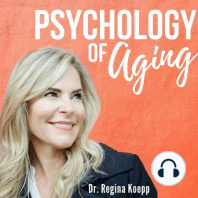51 min listen

FAQs about Dementia and Voting with Jennifer Mathis of The Bazelon Center for Mental Health Law
FAQs about Dementia and Voting with Jennifer Mathis of The Bazelon Center for Mental Health Law
ratings:
Length:
54 minutes
Released:
Oct 20, 2020
Format:
Podcast episode
Description
#030- Can people with dementia vote?A few weeks ago, I received an email from a listener:"Hello, Dr. Regina, I work in an assisted living facility. As the election approaches, family members of residents on memory care units have asked to have residents vote. Residents on this unit are here because they're unable to make informed decisions and don't have a grasp on reality. Also, the particular resident shows no interest in wanting to vote. It's the family that essentially wants to cast a vote for the individual, which seems unethical to me. I've tried reaching out to professional groups for some guidance to no avail. Do you have any thoughts regarding this topic? Older adults tend to vote more often and more consistently than other age groups. According to a US News Report, in 2018, 64% of adults age 65 and older voted in the November 2018 election, the best turnout of any age group. With this said, 10% of older adults, however, will experience a cognitive disorder, including a dementia disorder. It makes sense that the listener was asking the questions:Can people with dementia vote?Can people with dementia needing 24/7 care and supervision vote? Since this is such an important topic, I wanted to have the most up to date information for you, so I've invited Jennifer Mathis, Director of Policy and Legal Advocacy of the Judge David L. Bazelon Center for Mental Health Law on the podcast to answer all of our FAQs about dementia and voting. Here’s a sneak peek inside my interview with Jennifer Mathis:[07:41] There's a long history of voter suppression in Long Term Care Communities.Learn about this history and what we can do about it. [11:24] Jennifer discusses the history of voting fraud in the form of throwing out ballots of voters in the hospital. [15:54] Jennifer answers the question: "If my wife always voted Republican for all of her life. And I know that she would vote Republican now, can I mark Republican on the ballot for her?"[18:41] Jennifer describes the standards for voting capacity and reminds us that we have to apply to same standards to everyone. [24:38] Practically speaking: how do you help someone with dementia vote?We discuss this here. [28:22] What if the person with dementia has a legal guardian appointed by a court, can this person vote? Can the guardian vote for them? [39:19] Clinicians and long term care staff beware! You may think you know how to determine voting capacity, but chances are, you're not using the right set of standards. Mickey Mouse may not be an unacceptable candidate after all. [51:59] There are many resources to guide families and long term care communities in helping people with dementia to vote. Learn about them here. Click here to listen!Link to the show notes & resources mentioned in this episode, hereRate and Review Psychology of Aging Podcast with Dr. Regina KoeppIf you're on Apple Podcasts, help me help others by rating and reviewing my show. Reviews let others- just like you- care for the older adults in their lives.It's simple: 1. Just click here2. Scroll down to "Ratings and Reviews" 3. Tap or click "Write a Review"I read them all. Thank you!
Released:
Oct 20, 2020
Format:
Podcast episode
Titles in the series (100)
Grief and Loss During COVID (Part 2): Forced to Grieve Without a Funeral by Psychology of Aging with Dr. Regina Koepp